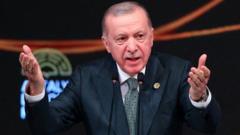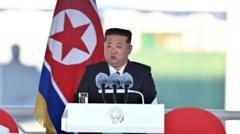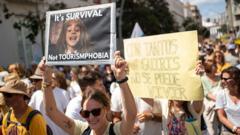The arrest of Yasin Akgul, a photojournalist, at his home amidst anti-government protests has intensified fears for Turkey's democracy. As the authorities suppress dissent, journalists and citizens alike are left anxious about their rights and safety.
Arrests of Journalists in Turkey Raise Alarm Over Press Freedom and Democratic Integrity

Arrests of Journalists in Turkey Raise Alarm Over Press Freedom and Democratic Integrity
The recent arrests of journalists covering anti-government protests in Turkey trigger widespread concern over the declining state of democracy and press freedom in the country.
On the early morning of March 23, Yasin Akgul, a photojournalist for AFP, faced an unsettling encounter as police arrived at his Istanbul home while his children were asleep. Just hours prior, he returned from covering large anti-government protests reacting to the arrest of opposition mayor Ekrem Imamoglu. The police carried an arrest order for Akgul, leaving him and his family bewildered and fearful.
“Seeing police at my door felt more frightening than any violence I've witnessed while working,” recalls Akgul, who has reported from conflict zones like Syria and Iraq over his 10-year career. His recent arrest, among seven journalists during early morning raids, was particularly chilling. The protests erupted in response to Imamoglu’s controversial corruption charges, which many believe are designed to thwart his political aspirations against President Recep Tayyip Erdogan.
Law enforcement had prohibited the protests but struggled to suppress citizens' outrage over what they perceive as politically motivated actions against the mayor. Akgul now faces allegations of participation in unlawful assemblies. His arrest serves as a stark warning to other journalists, conveying the message: "Don't shoot, don't speak, don't film." This intimidation has created a significant impact, as many freelance journalists opted to withdraw from the protests out of fear.
During his detainment, Akgul captured potent images showcasing the desperation and resilience of the protesters, including a striking photograph of a performer being pepper-sprayed by police. His work contributed to a narrative of resistance that resonates globally, while simultaneously placing him at considerable risk.
Akgul expresses concern that those targeted for arrest were primarily experienced journalists, signaling a systemic effort to eliminate credible voices from Istanbul's streets. Friends and colleagues have fled Turkey due to similar fears for their safety, leaving behind a culture where self-censorship and intimidation thrive.
The political landscape in Turkey has grown increasingly precarious. With nearly 2,000 detained in connection with the protests since March 19, including vulnerable students, human rights advocates warn that the government enforces a chilling warning against political activism among the youth. Observers note Erdogan's government has intensified its crackdowns on dissenting voices from various sectors, raising alarms about the erosion of democracy in Turkey.
As Akgul and many concerned citizens look ahead, they grapple with the uncertainty of Turkey's political future. Despite facing potential prosecution, Akgul remains resolute in his commitment to journalism. “I feel a responsibility to narrate the truth,” he asserts, as protests continue to challenge Erdogan's authority and ignite debates about democracy's fate in Turkey.




















